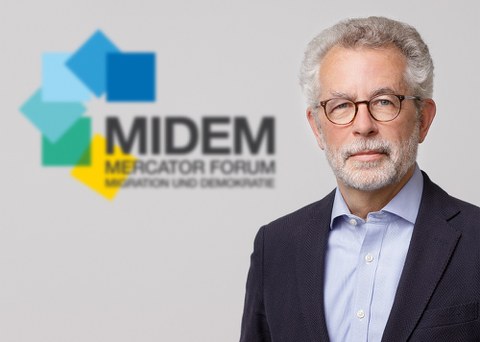13.04.2022
Krieg in Europa
Essay von Prof. Dr. Hans Vorländer, Direktor des Mercator Forums Migration und Demokratie (MIDEM) sowie des Zentrums für Verfassungs- und Demokratieforschung (ZVD) an der TU Dresden.
Der völkerrechtswidrige Angriffskrieg Russlands auf die Ukraine hat zwei Einsichten aufgenötigt: Zum einen, dass Krieg wieder die Fortsetzung der Politik mit anderen Mitteln ist. Und zum anderen, dass wir uns Krieg in Europa nicht mehr vorstellen konnten. Zur Erschütterung hat sich Fassungslosigkeit gesellt. Dabei bestehen unmittelbare Handlungsnotwendigkeiten – für Politik, Zivilgesellschaft, Öffentlichkeit und Wissenschaft.
Zu begreifen, was passiert ist und wie es zu erklären ist, ist eine gewaltige Herausforderung – zuallererst für politisch Handelnde, weil sie schnelle Antworten finden müssen und sich dabei auf Lagen einstellen müssen, die zuvor nicht oder nur unzureichend in ihrem Kalkül eingestellt waren. Was Krisen ohnehin erfordern, wird in Kriegen noch einmal dramatisch zugespitzt: die Notwendigkeit klaren und schnellen Entscheidens. Und dies in einer Situation, die langwierige Prozesse der Willens- und Entscheidungsbildung, also das den demokratischen Alltag kennzeichnende „langsame Bohren dicker Bretter“ (Max Weber), nicht zulässt. Zugleich findet ein solches Handeln immer unter Bedingungen der Ungewissheit, des unvollständigen und propagandistisch fälschbaren Wissens statt. Doch muss gleichzeitig erwartet werden, dass neben das Erschrecken und die Verzweiflung verantwortbares Handeln tritt - was angesichts einer auf zivile Opfer keinerlei Rücksicht nehmender, ja sie sogar in zynischer Weise strategisch einplanender Kriegsführung eine kaum zu bewältigende Rationalitätszumutung darstellt. Politisches Krisenhandeln steht dabei prinzipiell vor dem Dilemma, zwischen Handlungserwartungen und Entscheidungszwängen auf der einen Seite und Handlungsmöglichkeiten und Akzeptanzproblemen auf der anderen Seite agieren zu müssen. Die Gleichzeitigkeit von Krieg in Europa und der Vielzahl existenzieller, Leben und Gesundheit bedrohender Krisen, der Migrations-, der Corona-, der Klimakrise macht politisches Handeln zu einer Herkulesaufgabe.
Umso stärker kommt es auf die Mobilisierungsfähigkeit der Zivilgesellschaft an. Wie schon in den Jahren 2015 und 2016 zeigt sich derzeit unmittelbare Hilfsbereitschaft, um Millionen von Kriegsflüchtlingen aufzunehmen. Netzwerke, die sich in den Migrationsdynamiken der letzten Jahre vor allem auf kommunaler Ebene etabliert haben, konnten schnell aktiviert werden. Beeindruckend ist, wie hoch die Bereitschaft der an die Ukraine grenzenden Staaten ist, Hunderttausende, ja: Millionen von geflohenen Menschen schnell und unbürokratisch zu versorgen. Das war 2015/16 noch anders. Aber Überlastung und Erschöpfung sind absehbar, vorausschauende Koordinierung auf europäischer Ebene wie auch zwischen Bund, Ländern und Kommunen in Deutschland ist unabdingbar. Dabei kommt es nicht nur auf eine faire Verteilung geflohener Personen an, sondern auch auf die unbürokratische Sicherung des Zugangs zu Einrichtungen von Bildung und Gesundheitsversorgung, zu Wohnung und Erwerbstätigkeit. Die Lasten für die aufnehmenden Gesellschaften werden groß, aber zu bewältigen sein.
Auch die diskutierende Öffentlichkeit steht vor großen Herausforderungen. Wie die Prioritäten, so verschieben sich auch die Aufmerksamkeiten. Die „Zeitenwende“ verändert die Diskurslagen. Krieg war lange nicht vorstellbar. Das Projekt europäischer Integration, im Westen nach dem Zweiten Weltkrieg initiiert, nach 1990 auf Mitteleuropa erweitert, war nicht nur ein ökonomisches Prosperitätsvorhaben, sondern immer auch der Versuch, Demokratien zu stabilisieren und den Krieg unmöglich werden zu lassen. Das schien auch zu gelingen, die Clausewitzsche Formel, nach der Krieg die Fortsetzung der Politik mit anderen Mitteln ist, war für die Staaten der EU gegenstandlos geworden. Dabei geriet außer Blick, dass es an den östlichen Rändern des EU-Raumes und darüber hinaus Bedrohungslagen gab, die sich jetzt, aber auch schon zuvor, dramatisch zuspitzten. Nicht nur der Krieg auf dem Territorium des ehemaligen Jugoslawiens hätte Anlass geben müssen, über die Gefährdungslagen Bescheid wissen zu wollen. Die Kriege in Tschetschenien, die Invasion in Georgien, die Annexion der Krim, die Ausrufung von Volksrepubliken in der Ostukraine, der Einsatz von Vernichtungswaffen in Syrien hätten die Augen öffnen müssen für einen sich an den Rändern der EU entfaltenden neuen, territoriale Souveränität und Völker- und Menschenrecht mit Füßen tretenden Imperialismus. Die gleichzeitig sich vollziehende Systemtransformation innerhalb Russlands, die systematische Verweigerung von Grund- und Menschenrechten, die Ausschaltung der Opposition und die Etablierung von autokratischen, diktatorischen Machtstrukturen, wurde nicht in der gebotenen Klarheit wahrgenommen oder verdrängt. Die Hoffnung, mit Mitteln multilateraler Verhandlungsdiplomatie und dem Geflecht wechselseitiger ökonomischer Abhängigkeiten befriedend und verändernd wirken zu können, hat in tragischer Weise getrogen.
Was kann die Wissenschaft in solch einer Situation leisten? Eine der zentralen Funktionen von Wissenschaft ist die Selbstbeobachtung von Gesellschaften. Wissenschaft wird entscheidend zur Beantwortung der Fragen beitragen müssen, warum die (west-)europäischen Öffentlichkeiten und Akteure so grundlegenden Fehlannahmen über die jüngsten Entwicklungen erlegen sind. Hat die Annahme eines „Endes der Geschichte“, mit der die Demokratie nach dem Fall des realen Sozialismus unangefochten sei, zu einer diskursiven „Friedensdividende“ verleitet, nicht mehr mit Gewalt und Krieg rechnen zu müssen (obwohl in anderen Regionen der Welt, auch in den südlichen Anrainerstaaten des Mittelmeeres, diese Annahme schon längst dementiert worden war)? Auch die Wissenschaft wird sich kritisch selbst befragen müssen, ob sie immer die richtigen Fragen gestellt und die Gefährdungen und Bedrohungen freiheitlicher Ordnungen zureichend thematisiert hat. Universitäten sind der Ort, an dem das offen und streitig diskutiert werden kann – und muss.
Universitäten sind als Hort akademischer Freiheit auch ein ‚sicherer Hafen‘ für Studierende, Lehrende und Forschende, die verfolgt werden und zur Flucht gezwungen sind. Da bietet es sich an, dass sich Universitäten institutionell auch als University in Exile verstehen. Die TU Dresden hat sich nach der Migrationskrise von 2015/16 im Verbund mit anderen deutschen und internationalen Universitäten bereits als New University in Exile aufgestellt – nach dem Vorbild und auf Anregung der in New York ansässigen New School for Social Research, die 1933 eine solche Exiluniversität gründete und aus dem nationalsozialistischen Deutschland und Europa vertriebene Emigranten aufnahm. Nie wieder – so dachte, so täuschte man sich.
Über den Autor
Prof. Dr. Hans Vorländer ist Direktor des 2017 gegründeten Mercator Forums Migration und Demokratie (MIDEM) sowie des Zentrums für Verfassungs- und Demokratieforschung (ZVD) an der TU Dresden. Von 1993 bis 2020 hatte er den Lehrstuhl für Politische Theorie und Ideengeschichte inne. Er wirkt als Berater in verschiedenen Expertenkommissionen und ist Mitherausgeber der Zeitschrift für Politikwissenschaft. Zu seinen Arbeitsbereichen zählen Politische Theorie, Konstitutionalismus und Verfassung, Demokratie, Populismus sowie Migration und Integration.

